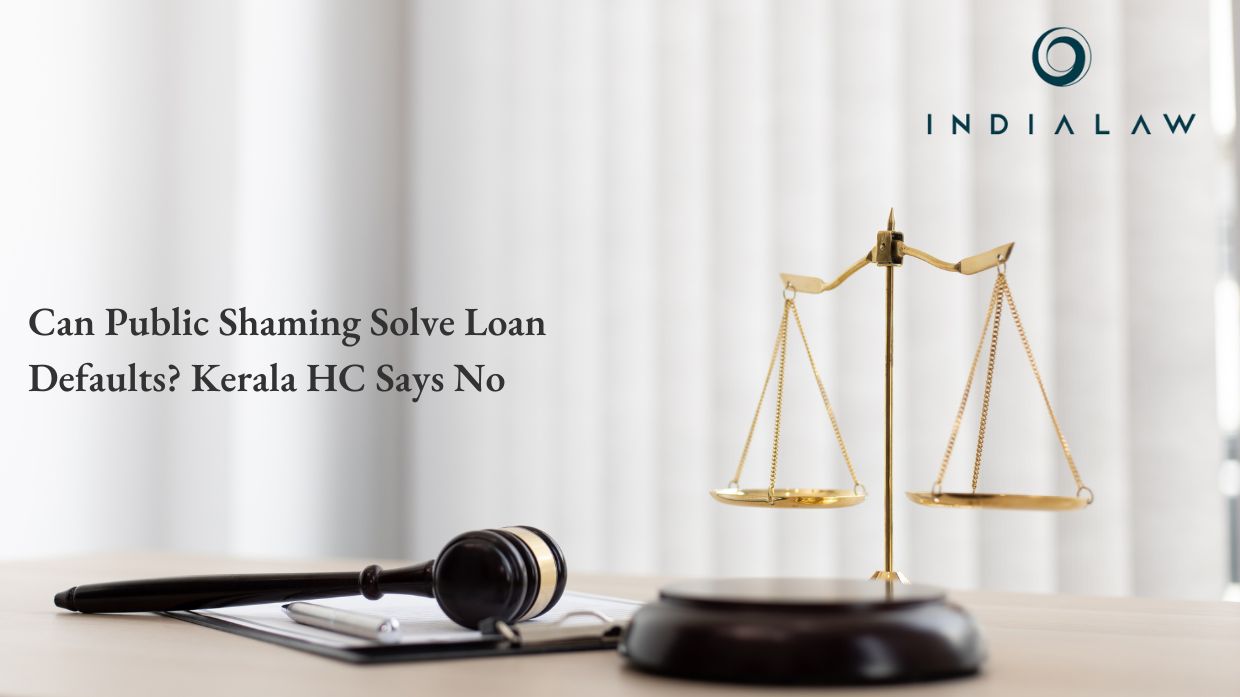Can Public Shaming Solve Loan Defaults? Kerala HC Says No

Introduction
In a significant judgment, the Kerala High Court addressed the delicate balance between financial recovery and individual rights. The case, brought by the Chempazhanthi Agricultural Improvement Co-operative Society and its Managing Committee, revolved around the publication of defaulters’ details on a public flex board. This action, intended as a last resort to recover overdue loans, was challenged by the Assistant Registrar of Co-operative Societies as a violation of privacy and dignity. The court’s decision not only upheld the directive to remove the board but also set critical legal precedents for the intersection of debt recovery methods and fundamental rights.
Case Background
The petitioners, a co-operative society, were grappling with high loan defaults, with overdue loans amounting to 59% of the total loan portfolio. As part of their recovery efforts, the Society displayed a flex board in front of their office listing the names, photographs, and loan details of 1,750 defaulters. According to the Society, this move had prompted many borrowers to either repay their loans, make partial payments, or renew them. Encouraged by the results, the Society intended to expand the initiative.
However, the Assistant Registrar of Co-operative Societies intervened, issuing a directive to remove the board, citing legal and ethical concerns. The Registrar argued that the publication of personal information without consent was illegal and could cause reputational harm, holding the Society’s Secretary accountable for any damages arising from the act.
Arguments Presented
Petitioners’ Contentions
- Financial Stability at Stake: The Society contended that its financial health depended on timely loan repayments, as deposits from members formed the basis for disbursing loans.
- Effectiveness of the Display: They argued that publishing the defaulters’ details had proven effective in incentivizing repayments.
- Reference to Rule 81: The petitioners cited Rule 81 of the Kerala Co-operative Societies Rules, 1969, which permits public announcements (“beat of tom-tom”) during the attachment and sale of immovable property, suggesting that their actions were similarly justified.
Respondent’s Contentions
- Violation of Privacy: The Assistant Registrar asserted that the public display of borrowers’ personal information without consent infringed upon their privacy and dignity.
- Constitutional Breach: The respondent emphasized that the action violated Article 21 of the Indian Constitution, which guarantees the right to life and personal liberty, including the right to live with dignity.
Court’s Reasoning
Statutory Framework
The court noted that the Kerala Co-operative Societies Act and Rules provided specific mechanisms for debt recovery, such as arbitration and the attachment and sale of property. However, these statutes did not authorize the publication of defaulters’ personal details as a method of recovery.
Constitutional Principles
- Right to Privacy and Dignity: The court held that the publication of personal information, such as photographs and loan amounts, constituted an invasion of privacy and harmed the borrowers’ reputation.
- Article 21 Protections: The court reiterated that any action depriving an individual of life or personal liberty must follow a legally established procedure. Coercive measures like public shaming were deemed unconstitutional in the absence of statutory authorization.
Relevance of Rule 81
The court dismissed the petitioners’ reliance on Rule 81, observing that the “beat of tom-tom” practice was archaic and unsuitable for contemporary times. While it refrained from commenting on the rule’s validity, it made clear that such practices do not justify infringing upon fundamental rights.
The Decision and Its Implications
The Kerala High Court upheld the Assistant Registrar’s directive, dismissing the writ petition. The judgment emphasized:
- Unauthorized publication of personal information is a violation of privacy and dignity.
- Debt recovery methods must align with constitutional safeguards, particularly those under Article 21.
- Outdated practices like public shaming or “beat of tom-tom” are incompatible with modern legal and social frameworks.
Conclusion
This ruling by the Kerala High Court highlights the importance of balancing financial recovery with respect for fundamental rights. While the recovery of loans is vital for the sustainability of co-operative societies, it cannot come at the cost of borrowers’ privacy and dignity. By reinforcing constitutional protections and discouraging coercive recovery tactics, the court’s decision sets a precedent for humane and lawful approaches to debt recovery. It is a timely reminder that even in financial matters, the rule of law and respect for individual rights must prevail.
For further details write to contact@indialaw.in
By entering the email address you agree to our Privacy Policy.



